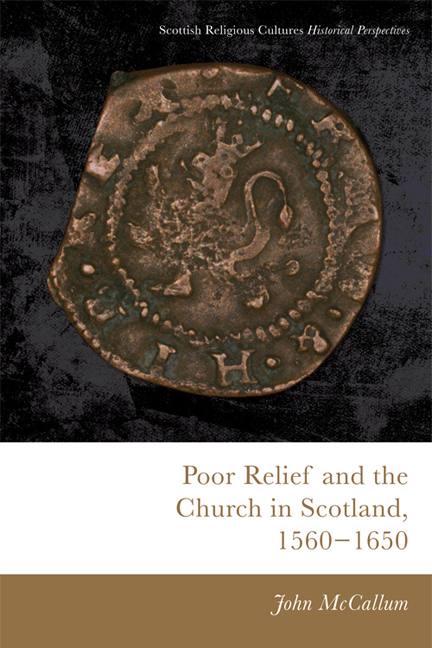Book contents
- Frontmatter
- Contents
- List of Tables
- Acknowledgements
- Conventions
- Abbreviations
- Map of Key Locations Mentioned
- Introduction
- 1 Ideas, Attitudes and Ambitions
- Part I The Development of Kirk Session Poor Relief
- 2 Urban Beginnings and Developments, c. 1560–c. 1610
- 3 Poor Relief Beyond the Main Burghs, c. 1590–c. 1650
- 4 Poor Relief Under Stress
- Part II The Nature of Kirk Session Poor Relief
- Conclusion
- Appendix Equivalent Values from Wages and Prices
- Bibliography
- Index
3 - Poor Relief Beyond the Main Burghs, c. 1590–c. 1650
from Part I - The Development of Kirk Session Poor Relief
Published online by Cambridge University Press: 14 September 2018
- Frontmatter
- Contents
- List of Tables
- Acknowledgements
- Conventions
- Abbreviations
- Map of Key Locations Mentioned
- Introduction
- 1 Ideas, Attitudes and Ambitions
- Part I The Development of Kirk Session Poor Relief
- 2 Urban Beginnings and Developments, c. 1560–c. 1610
- 3 Poor Relief Beyond the Main Burghs, c. 1590–c. 1650
- 4 Poor Relief Under Stress
- Part II The Nature of Kirk Session Poor Relief
- Conclusion
- Appendix Equivalent Values from Wages and Prices
- Bibliography
- Index
Summary
Introduction
It is no surprise that the earliest and most significant developments in early modern Scottish poor relief came in the leading cities of the realm, and the more substantial burghs of the east coast. But the vast majority of sixteenthand seventeenth-century Scots did not dwell in such places. They dwelt in rural areas, either in entirely rural parishes, or in parishes containing both a small burgh and surrounding countryside. What were their experiences of poor relief? How did the church in such areas attempt to tackle problems of poverty? And how did rural relief compare with welfare provision in major urban areas? The latter question typically prompts a rather negative response from Scottish historians: rural relief is seen as the poorer cousin of more substantial and forward-looking urban experiments. This perhaps partly reflects the prominence of European towns and cities in the welfare reform schemes of the sixteenth century, as well as the obviously greater sophistication and weight of governance and administration in towns. Indeed a recent study of English poverty stresses the uniqueness of the English Poor Law partly on the basis that ‘it covered rural as well as urban areas’. The kirk session, however, was a highly distinctive institution in that it had the same basic form, structure and agenda in town and countryside. And it was these kirk sessions, rather than any specific welfare-related scheme or experiment, which offered the most novel channel for poor relief in Scotland from 1560 onwards. Therefore this chapter assesses kirk session relief in rural Scotland on its own terms, examining the evidence from a range of parishes on an individual basis, as well as some smaller burghs, a wider range of which have surviving session records by the 1620s and 1630s. Rural kirk sessions had to raise funds in a different environment to their urban counterparts, and they also had to respond to different patterns of poverty. While broad comparisons with urban trends and policies can be made, it is essential that such an analysis focuses directly on the parishes in question in their own context.
- Type
- Chapter
- Information
- Poor Relief and the Church in Scotland, 1560–1650 , pp. 79 - 101Publisher: Edinburgh University PressPrint publication year: 2017



